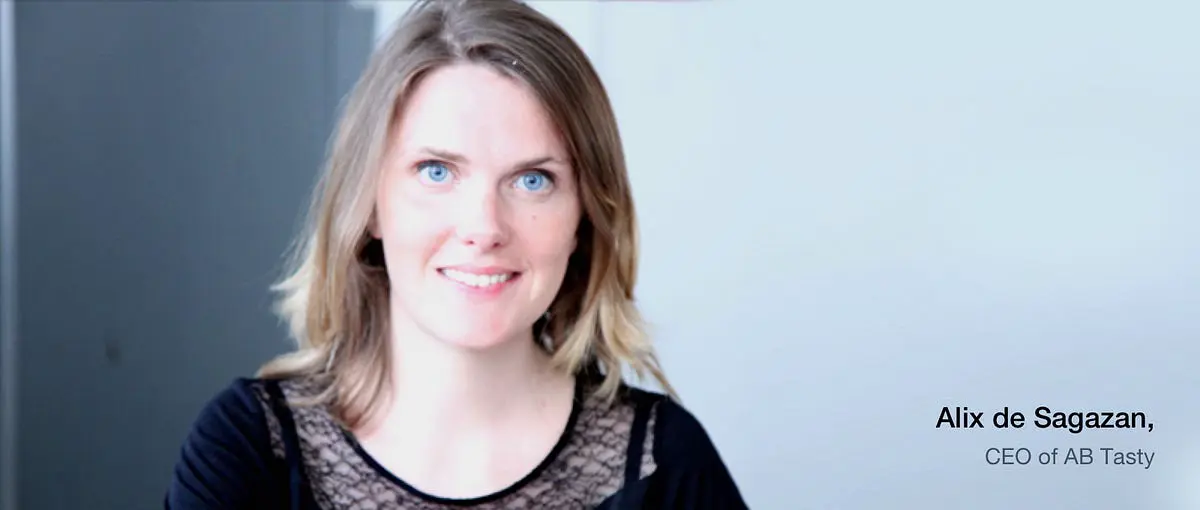Alix de Sagazan met Rémi when they worked together a web agency specializing in online traffic acquisition in Paris. In 2009, convinced that conversion was even more crucial than acquisition, they decided to partner up and create Liwio, an agency focusing specifically on conversion. The SaaS pivot from the agency model came a bit later.

Today, they are the two happy co-founders of AB Tasty, a SaaS application that enables e-marketers to modify their website without requiring any technical knowledge through A/B Testing and personalization. They recently raised €5M to invest in R&D and harness innovation whilst consolidating its international presence and expertise in mobile.
How did you end up building a SaaS company?
Back in 2009, for our first company Liwio, we were continuously analyzing websites to understand how they could boost their conversion rate. But, after a year of business activity, we came to the conclusion that an even better alternative would be to develop a tailored tool for marketing teams.
In 2010, A/B Testing was still quite technical and always carried out by developers. We decided to change this and began developing a dedicated software. In 2011, we tested the first version with Liwio’s clients and very quickly understood that it had amazing potential.
We decided to focus exclusively on this software and shut down Liwio at the end of 2012.
And, that’s how AB Tasty was born, and how Remi and I “fell” into SaaS.
What surprises did the SaaS model throw at you?
Back in 2010–2011, SaaS wasn’t really well-known or trendy in France, so we didn’t really know what we were getting into!
My first surprise was its recurrence and scalability. The agency model was difficult to scale and unpredictable, it all depended on whether or not if you’d filled the order book. Hence, you rarely had more than 3 months of visibility.
The second pleasant surprise was the ‘simplicity’ of the SaaS model. It’s very structured and there are KPIs and metrics for everything. In an agency, when you sign up for a mission with a client, you never really know in advance what will happen.
For you, what makes a successful SaaS entrepreneur?
For me, there are 5 key elements:
- Being able to challenge yourself and rethink your strategy. You have to be strong and agile enough to pivot.
- Listening to your clients, as the first signs you need to pivot and ideas for the next killer feature usually come from their feedback.
- Always listening to your teams as well as your peers (other SaaS entrepreneurs) because you want the same things: respectively, make the company work and resolve the common problems.
- Continuously test your product, it’s important to know what does and doesn’t work. Testing is learning.
- Having a great product vision, while always keeping the market in mind to make sure you’re not making a labyrinthine system.
How did you convert your first customer?
Our very first client was Photobox. They found us thanks to an article we published on a well-known blog and tried our MVP for 1 month. The great part of the story is that, at the end of the trial, they were willing to pay, but we hadn’t yet figured out our pricing. So, we invented the pricing together!
Bouygues Telecom, a major French Group, was also among our first clients. We did a MVP for them and it worked. Big Groups have the reputation to be a nightmare to convert but some have pioneering Innovation Departments that believe in startups.
We’ll always be very grateful to these first clients who trusted us even if we were a young company — in a way they’ve been our first Business Angels!
SaaS is often qualified as unsexy. What do you reply to that?
It might have been true in the past, but today, SaaS is definitely the new trend in B2B. Everybody wants to do SaaS nowadays.
Recurrence, structure, scalability, technology and vision combined in one single model… I think it’s incredibly sexy!
What would be your #1 advice for entrepreneurs launching a SaaS company?
Begin small, sell, be lean and make your clients pay as soon as possible. When something’s free, people don’t see its value and don’t use it in the same way as if they were paying. By definition, an MVP is valuable so make your clients pay and improve it with them.
For instance, when Bouygues Telecom began testing our MVP, I told them that even if they decided to not continue with us after the test, the’d be invoiced for the test period. Deploying an MVP for a client involves a lot of work that you should be paid for, even if the product isn’t perfect yet.
This approach allows you to share the risk and I believe that this is a key to success. Clients will be more motivated to make the MVP work than if they have invested in it.
Follow Alix de Sagazan on twitter and meet her in person at B2B Rocks, the leading European conference for B2B and SaaS startups happening on June 1st in Paris 😎
